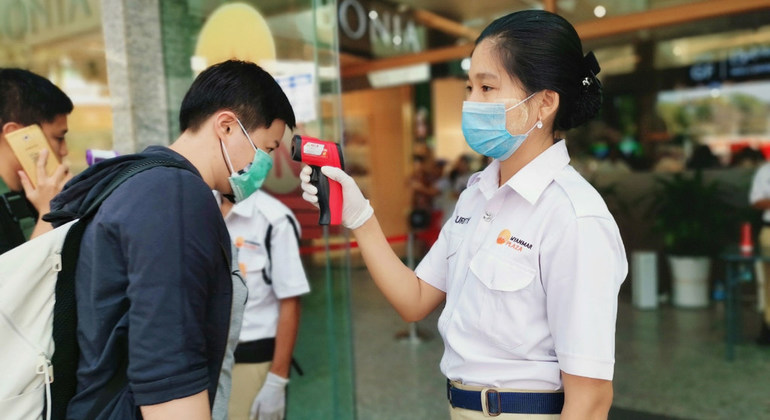“As of 6am Geneva time this morning, there were 42,708 confirmed cases reported in China and tragically we now have surpassed 1,000 deaths”, said Fadela Chaib, WHO spokesperson.
“To be precise, it’s 1, 017 people in China who have lost their lives to this outbreak. Outside China, we have 393 cases in 24 countries with one death; the one death is in the Philippines.”
As infections continue rising, since the novel coronavirus outbreak was declared in central China on 31 December, Ms. Chaib noted that this was likely owing to a “combination” of improved screening and detection measures.
“You are seeing more cases because we are detecting more cases and also because it’s a backlog of cases that are now being tested in labs,” she explained.
Experts brainstorm next steps
The development comes as some 300 scientists, public health agencies, ministries of health and research funders convened for a two-day meeting at WHO to share the latest information about the virus and decide how best to confront it.
Currently, there is no vaccine to protect against it and no proven therapeutics to treat those infected, WHO Director-General Dr Tedros Adhanom Ghebreyesus told those gathered at WHO headquarters for the Research and Innovation Forum on novel coronavirus 2019.
Appealing to participants for their scientific insight, Tedros also called for answers to many unknowns relating to the epidemic.
Tedros: meeting ‘not about politics or money’
These include the virus’s “reservoirs”, Tedros said, as well as its transmission patterns and degree of infectiousness. Other issues include which samples are best used for diagnosis and monitoring, how to manage severe cases of infection and any ethical issues that may surface relating to research requirements.
“This is not a meeting about politics or money. This is a meeting about science,” he insisted.
“There is still so much we don’t know….We need your collective knowledge, insight and experience to answer the questions we don’t have answers to, and to identify the questions we may not even realize we need to ask.”
One of the hoped-for outcomes of the meeting is an agreed roadmap for research around which researchers and donors can align.
Vaccine could be available in 18 months
A key imperative was the sharing of samples and sequences of the coronavirus, Tedros said, before insisting that “to defeat this outbreak, we need open and equitable sharing, according to the principles of fairness and equity”.
He told reporters that it may be 18 months before the first vaccine is available, “so we have to do everything today, using available weapons.” He called on Member States to be “as aggressive as possible” and view the virus as “public enemy number one”, in terms of public health.
Following the West African Ebola outbreak, the UN health agency devised a strategy for developing drugs and vaccines before future epidemics, and for accelerating research and development activities during outbreaks.
In line with this protocol, an “R&D Blueprint” team at WHO began work in early January this year, to coordinate and facilitate information-sharing on research elements of the response, Tedros explained.
Echoing the WHO Director-General’s comments, Ms. Chaib told a news conference that much was still unknown about the virus, which remains principally a threat in China.
‘Very early stage of understanding virus’
“We are still in the very early stage of understanding this virus,” she said. “How it is transmitted, the source of the virus, the incubation period, the clinical features, the severity of it…99 per cent of cases are in China; this remains very much an emergency for that country, but it’s also a high risk for the region, Asia, and for the world.”
Discussing the work of the coronavirus forum at the WHO, Ms. Chaib reiterated the hope that scientists would share information across many cross-cutting areas.
“They are not only talking about vaccines or therapeutics or diagnostic tests, they will also talk about the human-animal interface of this virus”, she said. “They will also talk about the clinical features of the patients they have seen, they will share information about all of this.”
Many unknowns
In response to a question that the incubation period of the coronavirus might turn out to be longer than two weeks – the currently accepted timeline – the WHO spokesperson underscored that “we have a lot of unknowns with this virus. We are saying it’s from one to 14 days. But we are welcoming all sorts of studies and scientific papers that provides more and more knowledge to the scientific community to better understand this outbreak and the virus itself.”


